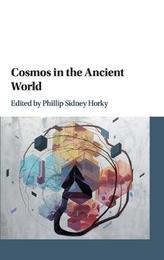
|
Cosmos in the Ancient World
Hardback
Main Details
| Title |
Cosmos in the Ancient World
|
| Authors and Contributors |
Edited by Phillip Sidney Horky
|
| Physical Properties |
| Format:Hardback | | Pages:370 | | Dimensions(mm): Height 235,Width 158 |
|
| Category/Genre | Western philosophy - Ancient to c 500
Philosophy - metaphysics and ontology |
|---|
| ISBN/Barcode |
9781108423649
|
| Classifications | Dewey:113 |
|---|
| Audience | | Professional & Vocational | |
|---|
| Illustrations |
Worked examples or Exercises; 2 Tables, unspecified
|
|
Publishing Details |
| Publisher |
Cambridge University Press
|
| Imprint |
Cambridge University Press
|
| Publication Date |
4 July 2019 |
| Publication Country |
United Kingdom
|
Description
How did the ancient Greeks and Romans conceptualise order? This book answers that question by analysing the formative concept of kosmos ('order', 'arrangement', 'ornament') in ancient literature, philosophy, science, art, and religion. This concept encouraged the Greeks and Romans to develop theories to explain core aspects of human life, including nature, beauty, society, politics, the individual, and what lies beyond human experience. Hence, Greek kosmos, and its Latin correlate mundus, are subjects of profound reflection by a wide range of important ancient figures, including philosophers (Parmenides, Empedocles, the Pythagoreans, Democritus, Plato, Aristotle, the Stoics, Lucretius, Cicero, Seneca, Plotinus), poets and playwrights (Sophocles, Euripides, Aristophanes, Plautus, Marcus Argentarius, Nonnus), intellectuals (Gorgias, Protagoras, Varro), and religious exegetes (Philo, the Gospel Writers, Paul). By revealing kosmos in its many ancient manifestations, this book asks us to rethink our own sense of 'order', and to reflect on our place within a broader cosmic history.
Author Biography
Phillip Sidney Horky is Associate Professor of Ancient Philosophy at the University of Durham. In addition to his monograph Plato and Pythagoreanism (2013), he has published articles and book chapters on topics in ancient philosophy ranging from metaphysics and cosmology to political theory and ethics. While continuing his research on Pythagoreanism in the Hellenistic and Post-Hellenistic worlds (in Pythagorean Philosophy, 250 BCE-200 CE: An Introduction and Collection of Sources in Translation (forthcoming, Cambridge), he is also writing a monograph on pre-Aristotelian theories of language and ontology, provisionally entitled Prelude to the Categories.
|